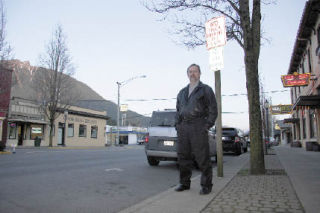North Bend is set to emerge from a ten-year-long, self-imposed development moratorium, Mayor Ken Hearing told the city council last week in his annual State-of-the-City address.
Unfortunately, the economic recession has dried up money for North Bend’s development.
“It is my belief, however, that given the natural beauty and strategic location of our town, this investment will in fact come and will be the catalyst for the invigoration and redevelopment of our down towncore,” Hearing said.
The recession has hurt many cities, including some communities that greatly increased spending in recent years due to development that has now dramatically halted. North Bend was spared this experience, because it banned further development after learning it was exceeding its water rights in 1999. The city expects to lift the ban by April.
“During this long ten-year stretch, North Bend’s officials learned to live a monk’s life; providing those services which were absolutely vital and running a fiscally conservative operation,” Hearing said in his address.
Caught in a financial “perfect storm,” many cities have been forced to cut services and jobs, but North Bend has been largely unscathed.
“An awful lot of cities are in tougher positions than we are,” he said in an interview with the Valley Record.
North Bend did cut one job when it re-organized several positions earlier this year, and its 2009 budget is tighter because of decreased tax revenue caused by the economic recession.
“There’re some good projects that just won’t be done this year because revenue is down,” said Duncan Wilson, North Bend’s city administrator.
Money that would have funded those projects had to be diverted to cover payments on outstanding loans, which paid for the city’s water mitigation system. The city had planned to make those loan payments using development fees, such as impact fees and general facility fees. The drop in development demand will likely greatly reduce whatever money the city collects for those fees. North Bend is also experiencing a smaller dip in other tax revenues, including real estate excise taxes, sales taxes and business and operating taxes, said Wilson.
City officials don’t know how much demand to expect from developers because of the economy, Hearing said.
The city plans to publish its budget of $5.8 million during the first week of March.
Regardless of the decreased tax revenue, Hearing remains optimistic about the coming years.
“I think the forecast is bright for us. Let’s call it ‘bright and sunny’,” he said, sitting in his shoebox office in city hall.
Three residential developers have already submitted plats for approval.
In his address, Hearing stressed the importance of North Bend’s downtown core, which currently has several underutilized properties.
He asked the council “to seek out opportunities in the next year to kick start the reinvention of downtown North Bend.”
The city should try to “bring willing buyers together with reluctant sellers” to “finally realize the long sought dream of downtown revitalization,” he said in his address.
Hearing did not specify any particular property owners. However, several semi-vacant properties exist in the downtown area.
Regardless of the difficulties it faces, North Bend is on the cusp of profound changes in its centennial year. The city plans this year to annex adjacent unincorporated neighborhoods, end the development ban, turn on a new water mitigation system and expand sewer services to the areas to be annexed.
The expanded sewer services would make the territory to be annexed much more attractive to developers, according to Wilson.
North Bend will be careful with its growth, and learn from the experience of cities in the area which had loose development standards.
Hearing wants development that maintains an inviting downtown core and community.
“I don’t want to see a sea of asphalt,” he said, and noted the experience of some cities along State Route 99.
“That’s not why people moved here,” he said.
Hearing wants the city to capitalize on its proximity to outdoor recreational activities and its shopping. He touted a first-class hotel in the downtown area.


